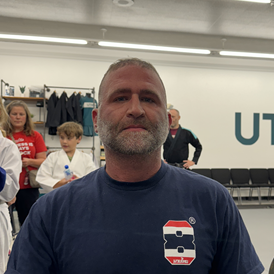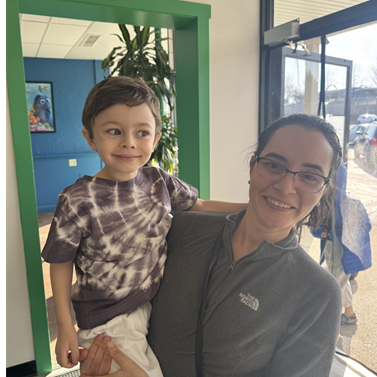
Kelley Sovol
via Google
Our 5 year old daughter just started taking lessons here and absolutely loves coming to class. As a mom, it's great to see her feeling more physically confident and empowered, and the classes are an excellent balance of learning discipline, focus, and self-control, as well as learning how to control an aggressive situation. The skills are taught in fun, safe, and respectful partner and whole class games.

Brittany Saunders
via Google
Honestly so happy we have had Utopia in our lives. The coaches have made such an amazing impact on our family. They encourage not only our child but the whole family to continue to do better. Our daughter has been able to build confidence in herself and her abilities. The coaches truly help each kid in their individual growths and developments and motivate them to pursue their next desires.

Kathy Fisk
via Google
Our family recently moved from Texas and my son left as a 2nd degree black belt in Tae Kwon Do. Wanting to try something new and challenging, we signed him up for BJJ. We have been coming to this facility for a little over a month now, and I can honestly say we are happy with our decision. This facility welcomed us with open arms and our BJJ instructor, Coach Vern, has really went above and beyond to make my son feel like a part of the BJJ family.

Gene Linfante
via Google
After just a few weeks we can see our daughter making progress in the classes at Utopia. She looks forward to the classes and really seems to enjoy the structured learning environment as well as the fun activities.

Casie Duemke
via Google
We have just started at Utopia and already have had such a great experience. Our daughter loves the coaches, they are fun but also know when to be serious. Our daughter has learned so much and is excited to show us all the new things she learns each class

LeNay Graham
via Google
What can I say? This place is absolutely a blessing! When my son and I walked out of his first class, I was in tears, so thankful for a place like this. I knew this was the right fit for our son! In the short time he has been there, I have been so impressed with their intentionality, their amazing communication, and how they care deeply about the character building of each of these kids.

Maggie Landry
via Google
My 5 year old has had an absolute BLAST joining Utopia. Coach Vern & Coach Drew are truly great with the kids, and are a good team. They instill discipline and have high expectations for the children- but they do it with fun, kindness, and are very approachable. Coach Drew always has a big smile and sets a great tone for class. Coach Vern empowers the kids to achieve greatness. We are very pleased.

Bonnie Wehby
via Google
My 6 year old daughter loves Utopia! It was recommended to us by a friend who has several kids in their program. Utopia is welcoming and organized. I like that classes are flexible, incorporate character development skills, are engaging and fun! My only regret is not finding Utopia sooner!

Kari Chang
via Google
Such a fun summer camp! Our girls love it every summer, and have met some great friends through the years! Love all the coaches and how much they truly care about my girls! Definitely recommend this summer camp to anyone who wants their kids to have fun and stay busy every day!

Stephane Fabus
via Google
This camp is FANTASTIC! My boys love it. They keep them busy, active and engaged. There is a lot of time outdoors and they learn discipline and self awareness through jujitsu. Can’t say enough aboit the awesome job this team does for the kids.

Alys Cannon
via Google
My son loves day camp! I'm very impressed with Utopia's level of organization for all the kids activities! Utopia's camp also has an impressive open door policy that works so well with our ever changing summer schedule! Two thumbs up!

Robby Schwanz
via Google
We've had a fantastic experience at Utopia BJJ during our first few weeks. As a parent, I'm impressed by how welcoming and inclusive the environment is for kids of all skill levels. The coaches are exceptional - they demonstrate excellent technical knowledge while creating a supportive atmosphere that encourages learning and growth. My son has already shown noticeable improvement in both his technique and confidence. What stands out most is how the gym's values align with what we want for our child's martial arts education.

Shaun L
via Google
This is our first year at Utopia Summer Camp and it has been a great experience for both our 8 year old and us. The camp is very organized, LOTS of activities, crafts, field trips, games, exercise and more! All of the coaches are responsible and know how to have a good time with the kids. The head coaches, Ava and Angie take their responsibility seriously, are professional, very nice, and also fun! If you have any concerns or frustrations with your current summer program, definitely check this one out!

Manisha Wanigatunga
via Google
We initially started in 2019 when our son was just 3 years old and when Utopia was Utopia! They've been great through the years. He's had an awesome birthday party there and everyone was saying how much fun it was for the kids. Over the years, our son had participated in their Easter egg hunts and parent night outs and looks forward to the next events. Really appreciate their ease of communication and how great the coaches are!

Luis Domoe
via Google
Utopia is an incredibly place for young kids to learn skills! The skills to grow confidence, respect and self awareness! My daughter has been going to Utopia martial arts for 2 weeks and is very excited to go to class every time! The staff at Utopia are amazing with the children and treat them with sincere respect and the expectation of growth! As a single full time father I want my daughter to be safe and have confidence to protect herself from harms way!

Anton Seban
via Google
If you're looking for a character building activity that's more than something else for kids to do, Utopia Martial Arts is it! Our son has been a part of this organization for just over a month and we already see a big difference in his confidence and self esteem. With lessons that extend beyond the mat, this is more than a sport. This is character shaping in a super supportive community.

Daniel Szedziewski
via Google
My son just started this month and is already hooked! He really enjoys learning the different techniques and the coaches are great showing things step by step. I see his confidence on the mat growing with each class and he enjoys his successes along the way.

Brittany Moeller
via Google
My daughter expressed interest in martial arts early. We tried another gym and didn't feel it was a fit, but we feel like this is a great place for her to start. The coaches are mindful of where kids are at developmentally based on age, but still teach them valuable skills (and not just BJJ). My daughter has been really happy so far, and so are we!

Brenda Baranczyk
via Google
I cannot say enough good things about the staff at Utopia. Our 5-year-old son started at Utopia in February, and we are so impressed. Yesterday our son went to practice and was having a sad moment before practice started. Coach Verne saw him and came to talk to him. He got on his level and totally changed our son's attitude around. This is something I have seen the coaches do with other kids but the 1st with my own.

Lauren Howie Laur
via Google
My son Theodore started at Utopia a couple months ago. We have both enjoyed learning new moves each month and practicing those moves at home. Utopia and the coaches provide more than just a place to learn BJJ, they create an environment that encourages growth, discipline and education. We both look forward to going to class each week and I've loved watching Theodore's growth within the class and at home.

Laurie Dybul
via Google
My daughter and i recently joined Utopia. It has been a great experience and we love it! The instructors and other students are very welcoming and the program is well organized. I would definitely recommend it to all my friends and family!

Adam Mueller
via Google
Perry opened up his gym for a law enforcement training April 10 - 13. Perry runs a top notch business and showed his support by hosting this training event. Perry also coached and shared his BJJ knowledge and skills with us so we could learn how to control people in a safe way. Thank you Perry for your support and professionalism!

Jacob Lorenz
via Google
Utopia has an extensive kids program in addition to their adult program which enables both me and son to go at the same time. They also support law enforcement with a great intro rate of $0 for beginners. Can't beat that.

Lizzy Schober
via Google
This is my 5-year old daughter's first experience in jujitsu and she is loving it thanks to her amazing instructors! You can tell that each child's individual needs are recognized and you really feel part of something special at Utopia!

Tiffany Hofland
via Google
My son has been attending Utopia for a few years, and it has been beneficial athletically and mentally. The teachers are very helpful showing kids techniques in fun, energetic ways. It is a very welcoming community of people, with a clean, comfortable environment. The teachers encourage kids to be responsible and disciplined on the mat and daily life. My son had gained confidence, especially with his coordination and athleticism. It continues to developed his problem solving and critical thinking skills.

Brian VanAdestine
via Google
If you're a father, husband, brother, son, and coworker, who wants to be better with all the hats that you wear each day, then join jiu jitsu at Utopia martial arts! I have been doing jiu jitsu for two years and each time l learn more about myself and the challenges I can overcome. If you want a work out that is challenging and engages your mind when you're not working out then jiu jitsu is for you!

Heather Warmington
via Google
I initially took my kids to check out Utopia Martial Arts to try and peek their interest but I kept thinking, "that looks so fun!" I took one trial class and was immediately hooked. What a fun way to exercise, socialize, and learn to move your body in new ways. I was a bit nervous to learn and do something like this in my late 30s but the entire group has been so welcoming (and patient).

Johannah Tietz
via Google
Our 4 year old son just started Ju-jitsu at Utopia a few weeks ago. In that short time we have already seen his confidence increase and he's been doing better at learning how to control his emotions when the outcome might not always be in his favor. This is something we've been really trying to work with him on at home as he is really hard on himself. It's been really encouraging to see how this sport has been helping him with that.

Megan Zumach
via Google
We enrolled our 4 year old in the program and have really enjoyed seeing him work with the coaches and other kids. The focus on teamwork, kindness and exercise is just what we were looking for. Each time our son ends the class he is sad the time is up! The facility is great and all the coaches are so nice.

Jesse Baranczyk
via Google
My 5 year old son joined Utopia last week. He has really embraced everything. We have been so impressed with the staff and their weekly lesson plan. We are most impresssed with how it carried over to our home. He know wants to make his bed, and is more in tune with daily discipline. Thank you!

Andrew M
via Google
Great place to get a unique workout. Offers a jiu jitsu, judo, kickboxing, and fitness courses. they offer free trials so if you're looking for something new do not hesitate to come give these classes a try.

Ilse Lipke
via Google
I started Utopia almost 3 years ago for Kickboxing to have a different fitness experience than a regular gym. Little did I know I'd gain 2 new sports, kickboxing and jiu jitsu! I've also gained confidence and new family! Utopia had classes in Kickboxing, jiu jitsu, judo , functional fitness, kids classes and will be starting an MMA class soon too! They have excellent instructors who want to see you succeed!

Tim Phillips
via Google
Love the culture and mix of sport BJJ and street BJJ. Judo classes are also fantastic. The classes are interactive, coaches always have time for questions. Great group of coaches and terrific group of people to learn and roll with!

Noah Cerbins
via Google
Very accommodating for college students that can only train during break and summer. Friendly environment, knowledgeable instructors and a great community. BJJ, judo and kickboxing have all been top notch classes. Utopia also gives you the opportunity to attend and participate in MMA and pankration events.

Matheus Silva
via Google
I was only a member of Utopia for a few weeks due to be just passing by the area, but if I was a local resident I would for sure stay long term. Even knowing this, they took me in and made me feel welcomed and a part of they crew. The black belts are all very knowledgeable and friendly, and the classmates were also great. Highly recommend Utopia for anyone wanting to learn more about BJJ and judo, find a community and work on themselves.

Konnor Parisi
via Google
I highly recommend checking out Utopia! The community is very welcoming. Their new BJJ fundamentals program is awesome! If you are a beginner or a seasoned martial artist, it's a great way to connect, stay active, and learn new techniques.

Nic Nygren
via Google
I started my martial arts journey 30 years ago. Throughout that time, I've been blessed with having amazing coaches/instructors. At 43yrs old, I'm finding myself a participant in a different ball game with Jiu Jitsu. I went in, thinking that I would get destroyed. However, I was met with point by point, step by step, move by move, technique. I've been shown the fundamental physics of what your body can do, and what it's capable of. The entire staff is incredibly welcoming, and knowledgeable.

Tyler Madoche
via Google
All 5 stars come from the community this gym has created. If you are new or looking for somewhere new to practice jiu jitsu, I have never felt more welcome. I used to manage a gym of my own and Ive got to say, the process of joining Utopia was the smoothest and most seamless transition of which Ive been a part. The owner meets with all newcomers, and every instructor brings something different to the table so you are always challenged.

Stephanie Nino De Guzman
via Google
My son is part of the amazing kids' Jiu-Jitsu class at Utopia! The instructors were super engaging, teaching the little ones not just techniques, but also discipline, respect, and teamwork. It's so much fun watching the kids grow in confidence and skill each week! Highly recommend for any child looking to build strength, focus, and make new friends.

John Mayberry
via Google
Just finished up my 3rd week of BJJ classes coming in with zero experience. I really like how the curriculum gives you a lot of repetition in what we're working on each week, not just throwing a ton at you hoping something will stick. I also like how you get various instructors depending on the day/time of the class, each instructor has their own things they point out on the techniques you're learning.

James Wood
via Google
I've been going to Utopia for a couple weeks now. Its has been a very welcoming experience. Everyone has been friendly and helpful with learning and developing. I highly recommend giving this gym a try if you're looking to get into BJJ, whether or not you have any prior experience.

Erika Fletcher
via Google
My boys started going to Utopia martial arts and absolutely love it. The staff is super welcoming, friendly and encouraging. The other kids in their classes are also super welcoming and helpful. It feels like an amazing community. They teach much more than Jiu jitsu, and I have already seen big changes in my kids' independence and confidence.

Fabiola Zuniga
via Google
My 3yr old son just started classes at Utopia and it's the activity he looks forward to most all week. Class focuses on basic movements and coordination in the form of fun games. Kids are learning all the basic jiu-jitsu skills without even realizing. There is definitely discipline and concentration and I love that he's learning it all in a safe and clean environment while having fun.

Kathryn Schmitt
via Google
I really think this is an amazing program. Kids get to be physical in a safe format and at the same time get great life lessons. Staff really seem to enjoy being around kids and helping them grow. Twice a week classes can be a big commitment so we've had to limit other activities, but my daughter really enjoys it.

Juli Nicholson
via Google
Utopia offers classes for children unlike anywhere else. The coaches make genuine connections with each child while instilling a strong sense of discipline. Each class is structured appropriately to hold the child's attention and keep them having fun with every new lesson.

Laura Ripple
via Google
We started our 2 kids at Utopia just over 1 month ago. It has been nothing short of amazing! In such a short time they have learned so much! They enjoy being part of a team and are so excited each day when it is time to go! They have not only learned ju jitsu skills, they have made new friends. The social skills taught each class are incredible; patience, respect, focus, listening to name just a few!

Noelle Clarke
via Google
Absolutely love the coaches and the staff as they go above and beyond to check on how your kid is doing in class and offer other opportunities. My son loves going and has been learning new moves and well as working on goals at home and in school.

Tori Saunders
via Google
It isn't easy for us to find activities or sports that will keep my 8 year old son with adhd engaged, but the staff and coaches at Utopia have been great with him since we started. It's nice to find a place for Gunnar where he always feels welcomed, and also manages to stay pretty focused. It makes me smile when Coach Vern asks him what the best part of his day was and his response is jiu-jitsu :)

R.J. Marcy
via Google
The decision on where to send our girls for martial arts was not easy or taken lightly. From what specific form to the ever more important "where" which is another way of saying "who will be responsible for the development of our children". We are parents who want our children to earn everything, and Utopia is in alignment with that. They also develop the children mentally in addition to physically.

Sarah Albrecht
via Google
My son has had a few sessions at Utopia so far but he really seems to be enjoying it. It has been a nice addition to our routine. I was very impressed with the initial walk-in that we had to get some more information, which led to us signing up for the trial class. After his first class, we signed up for a monthly membership. The communication with everyone has been excellent. The facility is clean and has a nice area for family members to sit and watch.

Elizabeth Riesen recommends Utopia
via Facebook ·
I'm so glad we found Utopia and that they offer classes starting at 3-4 years old. We love their focus on not only teaching physical skills, but also social and emotional skills for development. My son is 3 and has already learned so much. He looks forward to going to class each week and showing us what he learns. Thank you!

Amelia
via Google
My daughter has loved her experience at Utopia. We really appreciate the level of dedication from all the coaches. The team is very professional and hands on throughout class. We are all excited to watch my daughter continue to grow her skill and confidence via their programs.

Nathan Skoug
via Google
Utopia has been really good for my 5 year old son. We have only been going for about a month now and have already seen changes at school and home. Would definitely recommend for any child boy or girl.

Sarah Stagakis
via Google
Utopia was recommended to us by a friend. The introduction and trial process was a great opportunity to get a feel for the program and we signed up after the trial. The program is structured and fun for kids, they feel like they are playing games while gaining confidence in skills. My son is eager to practice his skills at home. The coaches are patient and offer great guidance during classes.

Marlee Muenchow
via Google
We found Utopia through a friend recommendation, and we are so glad we did! My daughter loves going to class each week. The coaches are spectacular, and they really care about each kiddo. The community of coaches and parents has also been so welcoming. If you're on the fence about signing up, take the leap! I highly recommend it.

Mallory Gandhi
via Google
We have loved watching our son in the Micro Monkeys class. He loves all the coaches and is learning a lot about independence and confidence. I would highly recommend Utopia to any parents looking for ways to get kids engaged in active, healthy, fun activities.

Megan Interial
via Google
Our son bad just started at utopia recently, but we have already noticed improvements in his behavior. He is so passionate about having his own fun thing to do do and wants to do his best. The coaches and atmosphere are all awesome!

Laura Gagala
via Google
My daughter just started 2 months ago but she looks forward to going every week. I really appreciate the work the coaches do in relating the content from class to situations outside of class (compassion, discipline, etc) and the ways the kids can demonstrate these skills at an age appropriate level.

Nick Storch
via Google
I have really enjoyed my time here so far. My son and I both joined about 1 month ago and everyone has been very welcoming. They are great with the kids and I appreciate how they emphasize life skills as much as martial arts technique. For myself, it's been a great workout and fun to learn technique as well. The instructors and other more experienced members have been amazing at taking the time to work with me and walk through the concepts as it's certainly challenging but fun.

Christina Pattengale
via Google
Utopia welcomed me as a newbie and I feel right at home. They have a strong adult program & the ladies group really encourages community. I appreciate the postive culture & values at Utopia and am excited to develop my skills here. They do a good job with onboarding and checking into make sure you are supported on your journey. I like the foundations class, so I can build my confidence as a newbie.

Joe Young
via Google
My son started in the Spider Monkey's program and is now in the Chimpanzees class. He thoroughly enjoys each and every class. Coach Vern and Drew are fantastic instructors and role models. I highly recommend Utopia!

Jason Chybowski recommends Utopia
via Facebook ·
Have been to several sessions now and always a great experience. Instructors are very good at walking you through the drills and being supportive. Other members have been supportive also despite being new and lacking any background in grappling. The positive culture is something they firmly believe in.

Jessyka Cibelly
via Google
My son was received in a warmly way by the team. They totally understand my child developing and are very helpful and nice with him. My kid has fun time while he learns better skills to be more disciplined. Thank you guys for the hard work!

Samm Wetzel
via Google
Such a lovely, charismatic, and enriching environment where kids can learn to truly be themselves and guide their little bodies into true leaders. My daughter has only been there for going to be a whole month already and she's truly evolving into the little leader she's destined to be! Truly grateful to have come across a place like this! Not only for the self defense, but for the courage to tackle all challenges of every day life! 1,000/10 recommend!

William Slinkman
via Google
As an adult returning to Martial Arts, Utopia Martial Arts has exceeded expectations. Class sizes are good allowing a breath of partners and instructors are knowledgeable and energetic about the material. Would recommend Utopia to anyone wanting to try martial arts for the first time or to return to training.

Midwest Strategic Solutions recommends Utopia
via Facebook ·
Perry Wirth's martial arts program at Utopia in Grafton Wisconsin is a state of the art master piece. Best in the nation and State of Wisconsin. Their leadership training for kids is unmatchable. The lessons our kids learn from the coaches at Utopia will stay with them their entire lives. Highly recommended.

Austen Lang
via Google
I have never done martial arts before do needless to say i had no idea what to expect. Over the past few weeks, every coach I have worked with and ever parton of the club has been nothing g but kind and understanding. I have never felt rushed or or out of place in any of the classes I have gone to. I would highly recommend this club to anyone from a complete beginner to even the seasoned MMA enthusiast.

Scott Brooks recommends Utopia
via Facebook ·
Our 6.5 yr old son joined a couple weeks ago and his excitement and comfort level continue to grow with every class. The staff and teachers have been very helpful introducing us to this martial art discipline and program. The positive atmosphere and constructive encouragement from the teachers has been excellent. Based on our experience so far, would highly recommend this program.

Joseph Mahas
via Google
Since joining Utopia I have felt welcomed immediately and the coaches have been very informative on proper technique to accomplish each move with efficiency. This is something I have been looking to start for many years and I finally took the leap to start this journey and I couldn't be more happier with the choice of doing this with Utopia! The cost as well is worth every hour I have spent and plan to spend growing this new skill I have been looking forward to starting!





































































